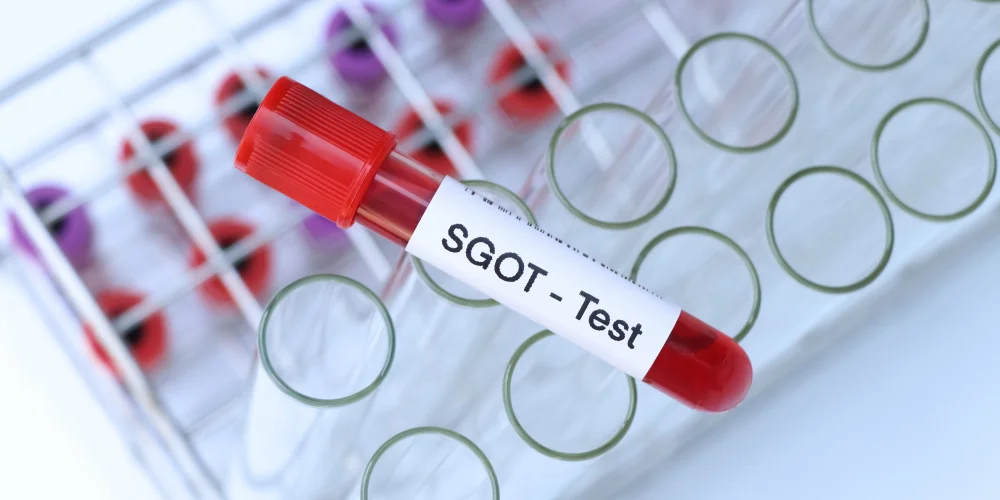Serum Glutamic Oxaloacetic Transaminase
Assessment of Liver Function and Health
It is the Serum Glutamic Oxaloacetic Transaminase (SGOT ) test, also referred to by the name Aspartate Transferase, is an important diagnostic tool that evaluates the health of your liver by analyzing the levels of enzymes in blood. AST is found primarily within liver cells, as well as in other organs, such as the muscles and heart. A rise in AST levels in blood may indicate damage to the liver or illness, aiding medical professionals diagnose and track different conditions that affect the liver as well as other organs.

When is the SGOT Test Prescribed?
It’s crucial to diagnose liver disorders including cirrhosis, liver hepatitis and fatty liver diseases through the measurement of AST levels. This provides crucial information about the state of liver. This test can also be useful to monitor the function of the liver for patients suffering from issues with their livers or who are undergoing treatment that might affect the liver’s health. It can aid in the management of disease and treatment scheduling.
For cardiac examinations, specifically following a heart attack or myocardial injury, high AST levels could be a sign of heart muscle injury and help healthcare professionals assess the health of their patients’ hearts. In addition to that, the SGOT test evaluates the severity of muscle injuries especially in the context of conditions that affect the health of muscles, aiding in the detection and management of the underlying disorders that affect muscles. All in all it is believed that the SGOT test has a crucial part in identifying liver disease and monitoring liver function. It is also useful in monitoring cardiac health after heart incidents, and in evaluating muscles injury. It is a significant contributor to comprehensive care for patients in diverse medical situations.
Preparation for the SGOT Test
There is no special preparation needed for preparation for the SGOT test. The test subjects can consume food and drinks normal before taking the test. It is important to inform your physician of any supplements, medications or other recent health conditions which may affect the result of the test.
Parameters Considered During SGOT Test
The SGOT test is a measure of the amount of AST in blood. The elevated AST levels could be a sign of liver disease or damage heart issues or injury to muscles. This test can provide crucial information in identifying and treating diverse health problems effectively.
Time Required for SGOT Test Report
The results of the SGOT test typically are available in a matter of days. This speedy turnaround time allows health professionals to quickly assess the liver’s functions and those of other organs and advise appropriate treatment or additional diagnostic tests should it be required.
SGOT Test Price
In Chirayu SuperSpeciality Hospital, the SGOT test can be purchased at a reasonable cost at 220 rupees. This affordable option provides access to the most crucial information needed for diagnosing the health of organs and livers.
Book an Appointment for SGOT Test
Making an appointment for the SGOT test is quick and easy. The test can be scheduled on our site or call our team to get assistance.
What Our Patients Say
Hear from our valued patients about their experiences at Chirayu Super Speciality Hospital and how our care has made a positive impact on their health and well-being.


Reliable results, caring staff. Great support from the healthcare team.


Helped detect liver issues early. Important for my ongoing treatment.


The test provided crucial insights into my health. Grateful for the accurate results.


Efficient testing process, affordable price. Highly recommend Chirayu Hospital.


Professional service, compassionate care. Vital for monitoring my liver function.


Prompt diagnosis, clear results. Helped manage my liver health effectively.
Frequently Asked Questions
Here, we provide answers to some of the most commonly asked questions to help you better understand our services, policies, and facilities. If you have any additional questions, please do not hesitate to contact us.
Elevated S.G.O.T levels may suggest liver damage or disease, cardiac issues, or muscle injury.
Yes, certain medications and supplements can influence S.G.O.T levels. Inform your healthcare provider about all medications you are taking.
No, fasting is generally not required unless specified by your healthcare provider.
The frequency of testing depends on your health condition and your healthcare provider’s recommendations.
Abnormal levels may indicate underlying health issues. Further evaluation and treatment may be necessary based on your test results.